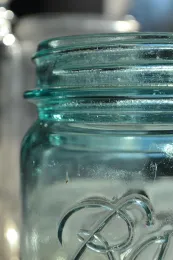
Preserve It! Properly using canning jars helps ensure a safe outcome
by UCCE Master Food Preserver of El Dorado County Laurie Lewis
We are well into spring, heading toward summer. Seed catalogs were dog-eared months ago, seed packets are in a basket (or perhaps already opened and sown). There are high hopes of a great harvest this year, an abundance of fresh vegetables and fruit from the garden. Soon it will be canning season! Do you have enough canning jars and lids? Scouring the garage and estate sales for more? Let us help you with safe food preservation. Here are some myths and misconceptions about canning jars and lids.
Myth: Brand new canning jars fresh out of the box are sterile and don’t need to be washed.
Truth: New jars are not sterile.
Before use they should be checked for breakage or manufacturing defects and then washed. In fact, jars should always be checked and washed right before use (even if they were previously stored away clean).
Myth: Canning jars must always be sterilized before canning in them.
Truth: Jars need to be sterilized only when the processing time is under 10 minutes.
Myth: The flat part of two-piece metal jar lid systems should be boiled before canning.
Truth: The sealant used on most metal canning lids changed from rubber latex to plastisol decades ago, at which time the need to boil lids ceased.
Boiling can damage the plastisol, resulting in seal failures. While it is safe to simmer lids (~180 degrees F) before use, it’s unnecessary and thus a waste of energy. All this said, do check the instructions from the manufacturer for your particular brand of lid for specific handling requirements.
Myth: Mayonnaise, sauce, and other similar commercial product glass jars can be reused for canning.
Truth: These types of jars are not designed to be repurposed for home canning and are not recommended.
They may not have the correct tempering to withstand high temperatures or long processing times, so jars may break. Some jar rim sizes vary slightly, leading to seal failures. Even those pasta sauce jars that say “Atlas” on them are not actually home canning jars, and the manufacturer specifically states on their website that they should not be used for home canning. The Hazel-Atlas Company made home canning jars long ago, but the company no longer exists. The “Atlas Mason” stamped on the sides of jars of sauce is just a marketing device. Just as with other commercial product jars, breakage and seal failures are a big risk if they are reused for canning. Because of the risk of breakage (and thus loss of food) and seal failures, reusing commercial product jars is not recommended. Should you decide to try it anyway, use them only for boiling water/steam canning. Do not use for pressure canning. Commercial product jars can be safely reused for storage of dry foods.
Good luck with your garden and have fun preserving those vegetables!
The UC Master Food Preservers of El Dorado County are a great resource for answers to your food safety and preserving questions. Email us at edmfp@ucanr.edu. For more information about our program, events, and recipes, visit our website at link.ucanr.edu/mfp-cs. Find us on Facebook, too (UCCE Master Food Preservers of El Dorado County)!
